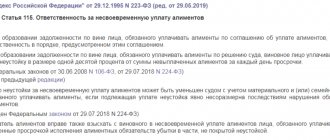What is non-payment of child support?
Failure to pay alimony is the refusal of one family member, including a former one, to fulfill his obligations to support another family member in the form of payment of money or other form provided by law.
Failure to pay alimony threatens the defaulter with administrative and criminal liability. To find out the amount of alimony debt, you need to contact the division of the Federal Bailiff Service (FSSP), which has initiated enforcement proceedings against the defaulter. This can be done in person or by sending an application by mail.
You can find out the amount of alimony debt by last name online in the database of enforcement proceedings or by submitting a request through the online reception.
What to do if you don't pay child support?
It’s one thing when the offender is the child’s father, who does not want to resolve the financial issue and refers to a lack of funds. But what to do if the organization does not pay alimony when the sheet is submitted to the accounting department. Although no one can guarantee that the money will be transferred on time and in full, delayed payment from the legal entity where the writ of execution is stored is not that common.
The consequences for responsible employees of the company are too great to ignore the requirements of the writ of execution if the organization does not pay alimony.
Who is responsible
Not all employers successfully cope with commercial tasks and make a profit. Sometimes there are delays in payment of earnings, which means that alimony amounts will not arrive on time.
The reason is not at all a reluctance to pay money for a child, but is due to a lack of funds in the company’s account. The accounting department employees or managers responsible for financial matters are not considered to be at fault if a technical glitch or equipment failure occurs. Sometimes the payment does not arrive on time due to the sluggishness of the servicing bank.
It is possible to hold people accountable for failure to comply with a court decision only when it becomes obvious that specific people are guilty of accumulating alimony payments. If the circumstances are objective, the court will not punish the company’s personnel.
Sometimes company representatives are still guilty, and this is due to the dishonesty of the people who are entrusted with managing the organization’s financial flows. Employees often negotiate with accounting to delay the payment of child support based on an allegation of late wages. If we omit the moral and ethical side, such authorized persons of the enterprise are subject to punishment through the court if it is possible to prove the fact of collusion with the alimony payer.
Administrative responsibility
Bringing to administrative liability for non-payment of alimony is regulated by Art. 5.35.1 Code of Administrative Offenses of the Russian Federation. In accordance with Part 1 of this article, a parent debtor of alimony who evades fulfilling his duties in relation to a child (children) for at least 2 months faces one of the following penalties:
- compulsory work up to 150 hours;
- arrest from 10 to 15 days;
- a fine of 20 thousand rubles (for those who cannot be sentenced to compulsory labor or arrest).
Children who do not fulfill alimony obligations towards disabled parents for the same 2 months or more after the initiation of enforcement proceedings may also be subject to punishment for non-payment of alimony (Part 2 of Article 5.35.1). The options for possible punishments are the same as for deviating parents.
Moreover, in accordance with the provisions of Art. 67.1 of the Federal Law of October 2, 2007 No. 229-FZ “On Enforcement Proceedings”, bailiffs have the right to suspend the right to drive a vehicle, which essentially means deprivation of a driver’s license.
What threatens the defaulter?
Alimony is a payment aimed at providing for the basic life needs of a minor child. In some cases, he does not have another source of finance for existence due to the peculiarities of his situation (minor age, incapacity, and so on). Therefore, the legislator has provided several ways to influence the defaulter.
The following sanctions may be applied to a defaulting alimony payer who deliberately avoids fulfilling his obligation:
- visits by a bailiff service officer at the place of residence, delivery of notices and calls to the FSSP;
- ban on leaving the territory of the Russian Federation (applied in accordance with the Federal Law “On Enforcement Proceedings” in the presence of debt);
- accrual of penalties (its amount is equal to half a percent for each day of delay in payment);
- administrative measures in the form of a fine, compulsory labor or administrative arrest;
- measures of criminal liability, up to imprisonment.
Fine
These measures are applied with the aim of reducing the number of prisoners under by no means the most serious charges, as well as additional stimulation of citizens to fulfill their obligations.
Additional penalties for non-payment of child support include the deprivation of certain special rights, which include the right to drive vehicles and parental rights.
Revocation of driver's license
The use of such a measure as deprivation of a driver’s license is justified only if the debtor has a debt of more than 10,000 rubles, as well as the fact of malicious evasion of duty has been established.
Expert opinion
Stanislav Evseev
Lawyer. Experience 12 years. Specialization: civil, family, inheritance law.
The process is regulated by the Federal Law “On Enforcement Proceedings”. It is important to understand that this measure applies not only if there is arrears of alimony, but also, for example, in case of non-payment of compensation for injury to health or property damage.
That is, deprivation of rights is a measure of liability for evading the execution of a judicial act, but not a special measure applied only in alimony obligations.
It is important to understand that such a measure does not apply if the use of the vehicle is a source of income for the debtor (for example, he works as a driver), since this will significantly reduce his ability to repay the debt, which will violate the rights of the recipient.
Deprivation of parental rights
Malicious evasion of the obligation to pay child support may have consequences in the form of deprivation of parental rights, as stated in Art. 69 RF IC. However, this process requires a whole range of reasons and often the mere fact of non-payment of alimony is not enough.
A citizen deprived of parental rights will not be able to take part in the child’s life (represent interests, approve transactions, etc.), and will also lose a number of rights (for example, inheritance or receive government subsidies), but will continue to bear a number of responsibilities, including the payment of alimony.
Administrative responsibility
At the moment, measures of both administrative and criminal liability may be applied to the debtor for failure to fulfill this obligation.
In any case, it is necessary that the person deliberately evades payments, otherwise sanctions cannot be used to influence the payer.
Changes in legislation indicate that, first of all, liability is applied to a person in accordance with Art. 5.35.1 of the Code of Administrative Offenses of the Russian Federation, and only then, in case of continued failure to fulfill the obligation, the articles of the Criminal Code are used.
Administrative measures against alimony defaulters:
- in payment of a fine in the amount of 20,000 rubles;
- compulsory work for up to 3 months;
- arrest up to 15 days.
The purpose of this innovation is partial decriminalization of the act and, as a result, a reduction in the number of prisoners for such offenses, as well as additional influence on citizens in order to fulfill their obligations.
Criminal liability
In fact, first of all, administrative measures are applied to citizens, then, after the execution of the punishment, if a person continues to violate the rights of the recipient for more than 2 months, the norms of the Criminal Code of the Russian Federation can be applied to him.
In this case, the following is considered evasion of alimony:
- presence of outstanding obligations for a period of 3 or more months;
- lack of measures to repay the debt (if the defaulter does not work, he must be a member of the Labor Center);
- deliberate actions aimed at evading alimony (concealing income, “gray” salaries, selling property under fictitious transactions).
Criminal liability for evasion of alimony comes only after a criminal case has been initiated and a court verdict has been issued.
Possible measures against the alimony provider:
- correctional or forced labor for up to 1 year,
- arrest for up to 3 months,
- imprisonment for up to 1 year.
The maximum amount given for evading the payment of alimony in the absence of valid reasons is imprisonment for up to a year, but such a measure is used only as a last resort, when other methods have already exhausted themselves.
Criminal liability for non-payment
Let's move from administrative to criminal liability and tell you in what cases a non-payer of alimony can be brought to criminal liability. This possibility is provided for in Article 157 of the Criminal Code; a defaulter can even be sent to prison due to alimony debts. In accordance with the provisions of Article 157 of the Criminal Code of the Russian Federation, criminal liability for non-payment of alimony arises for repeated evasion of payment of alimony without good reason:
- in relation to parents who do not fulfill their obligations to support minors and disabled adult children (Part 1);
- in relation to able-bodied children who do not fulfill the responsibilities of supporting disabled parents (Part 2).
Punishment options for crimes provided for in Parts 1 and 2 of Art. 157 of the Criminal Code of the Russian Federation are the same. The defaulter may be sentenced to:
- correctional labor for up to 1 year;
- forced labor for up to 1 year;
- arrest for up to 3 months;
- imprisonment for up to 1 year.
An explanation of what repeated non-payment means is contained in the same article. 157 of the Criminal Code of the Russian Federation. Repeated means failure to pay alimony if it was committed during the period when the violator was subjected to administrative punishment for a similar act.
Malicious failure to pay alimony
Evasion from paying alimony is not always a consequence of malicious intent; life circumstances, for example, loss of sources of income, often act as obstacles to fulfilling obligations. However, it also happens that defaulters deliberately commit violations out of a desire to save on payments. The main sign of malicious evasion of alimony payments is frequent changes or concealment of place of residence and work. The consequences for persistent non-payers of alimony are described in the previous sections.
In addition, it is possible for the father to be deprived of parental rights for failure to pay child support by court decision.
Guilty actions of the alimony payer and measures of liability
One of the important conditions for qualifying a crime under Art. 157 of the Criminal Code of the Russian Federation is the intent to evade making payments to the recipient’s account and the conscious adoption of measures to conceal income and property. In this regard, the onset of liability arises depending on the guilty actions of the alimony obligee:
- non-payment for reasons beyond the control of the citizen;
- deliberate malicious evasion of financial support.
If the debt arose without the debtor’s guilty actions, the person has the opportunity to prove his innocence in court. The court may cancel the penalties applied (penalty or ban on leaving the country) and reduce the amount of debt or remove it in full.
If liability measures were applied repeatedly, but the desired measures were not achieved, then the person is considered a willful defaulter. In this case, the citizen may be held criminally liable.
Signs of malicious evasion
Criminal penalties for non-payment arise only in cases where the maliciousness of the evasion from depositing funds is proven. Malicious evasion is understood as an unmotivated refusal to provide financial support to a minor or disabled relative.
A prerequisite is the collection of financial support in the manner prescribed by law. The Family Code provides three options for collecting funds for persons in need of financial support:
- Notarial agreement.
- Performance list.
- Court order.
If a citizen refuses to voluntarily execute a court decision or a notarial agreement, the document is sent by the claimant to the FSSP to initiate enforcement proceedings. The result of the activities of the SSP is the forced withholding of unpaid financial support for the recipient.
Important! It is impossible to bring to criminal liability a person against whom enforcement proceedings have not been initiated. The recipient must first take all possible measures to recover in full.
In order to qualify evasion as malicious, there must be a combination and/or repetition of illegal actions. Evasion is considered malicious if the debtor:
- change of place of actual residence, secret from the SSP;
- providing false information about income;
- concealment of data on the presence of valuable property;
- repeated bringing to administrative responsibility;
- hiding information about your location;
- refusal of official employment;
- refusal to register with the Center for Significance;
- the period of evasion is at least 4 months.
After the initiation of enforcement proceedings, the debtor is obliged to inform the SSP about a change of residence. If information about the move is concealed and there is no information about the residence of the person liable for alimony, the bailiff is obliged to put him on the wanted list.
The amount of payments for relatives is often set as a percentage of all types of income of the payer. Therefore, it is of particular importance to provide bailiffs with complete information about all types of earnings, pensions and other types of income.
If it is impossible to withhold funds from a citizen’s income, the penalty is applied to the person’s valuable property. This includes bank accounts and deposits, securities and shares, movable and immovable property, luxury goods (jewelry, furs), household appliances, television and video equipment, gadgets (tablet computer, smartphone). Concealing information about the availability of property is a violation.
Bringing to administrative liability is possible simultaneously under several articles of the Code of Administrative Offences. However, repeated prosecution is considered repeated during the period of the previous punishment.
Financial support for relatives can only be deducted from official income. Hiding information about employment or refusing to look for a job is a way to evade payments. If there are no vacancies in the locality suitable for the debtor, the person is obliged to contact the Employment Center to register as unemployed. The employment center assigns payment of a monthly benefit, which also includes alimony.
The law differentiates the severity of evasion depending on the duration. If funds are not paid within a period of up to 2 months, the person will be held administratively liable. In the absence of financial support for at least 4 months, a citizen may be subject to criminal liability. Such evasion without good reason is malicious.
Reasons for exemption from liability for non-payment of financial support
If the ex-husband does not pay alimony, what happens to him? It all depends on the presence of culpable acts. In the absence of malicious intent, the formation of debt may occur as a result of a special situation in the life of the debtor.
If there are good reasons, the person obligated for alimony has the right to apply to the court to reduce the amount of the mortgage or write it off completely.
The main reason for canceling debt and penalties is an emergency. Actions of force majeure include:
- weather events (natural disasters);
- man-made accident;
- terrorist operations;
- fighting.
In the event of an emergency, there are no culpable actions of the citizen in the formation of the debt.
Important! The debt is not written off automatically.
The debtor has the right to file a claim in court to reduce the amount or completely write off the debt. As evidence, it is necessary to provide information about the reasons that served as the basis for the formation of the debt. The court decision must be transferred to the SSP to adjust the amount.
The procedure for collecting alimony
If the child’s father does not pay alimony voluntarily (by agreement), then, according to the norms of family law, it is collected by the court (Article 106 of the RF IC). To do this, a person who has the right to receive alimony must file a claim with the court for the recovery of alimony, regardless of the period that has passed since such a right arose (Article 107).
If the alimony holder evades fulfilling his duties in the presence of a court decision to pay alimony, then the recipient must contact the bailiff service, which ensures the execution of court decisions. We'll talk about this further.
How to sue for non-payment of child support
A non-payer of alimony can be brought to justice only if a court decision was previously made on the issue of collecting these payments or the parties entered into a notarized agreement.
There is no other procedure for judicial prosecution and it will not be possible to apply the norms of the criminal or administrative code.
A person who does not pay child support voluntarily is unlikely to agree to enter into a notarial agreement, so the potential recipient will have to go to court.
You can do this in two ways:
- Apply for a court order.
- File a claim for alimony.
As a general rule, an order is mandatory in the following cases:
- if recovery is planned as a share of the payer’s earnings;
- the claim is filed when appealing the order;
- when collecting payments in a fixed amount;
- if the defendant’s income is unknown;
- when considering the issue in parallel with another dispute being considered in a lawsuit (for example, during divorce in court).
If alimony has already been collected, but is not being paid, you can collect a penalty through the court for non-payment of alimony.
It is impossible to bring the defaulter to other liability through legal action!
Procedure and procedure
To collect alimony through the court, the recipient must perform a number of actions:
- Contact the payer with a proposal to conclude an agreement (if possible).
- Prepare the necessary documentation package.
- Draw up an application for an order or a statement of claim.
- Submit the document to the court.
- Take part in the trial (the order will be issued without the participation of the parties).
- Receive a decision and a writ of execution after the act comes into force (the order will serve as a decision and a writ of execution at the same time).
- Contact the FSSP to initiate enforcement proceedings.
Statement of claim
The current legislation does not provide for filing a claim in connection with non-payment of alimony to bring the defaulter to justice.
The only exception is the collection of penalties for non-payment of alimony, which can take place in parallel with bringing the defaulter to justice.
Read more about collecting penalties for alimony here.
Documentation
Applying to the court to collect a penalty for debts in the form of alimony requires documentation confirming the position of the applicant.
The following documents may be required:
- a document that confirms the identity of the applicant;
- certificate of marriage, divorce, and birth of children;
- papers confirming the recipient’s income, as well as certificates of income of the intended payer (if available);
- medical documents confirming the health status of the child or other recipient, as well as the need for treatment and documents confirming the costs of medicines;
- other papers substantiating the plaintiff’s position;
- document justifying the payment of alimony.
If the applicant does not participate in the process personally, but through his legal representative, he is required to provide a duly certified power of attorney.
Application to the bailiff for non-payment of alimony (sample)
The next step that the recipient will need to take after collecting alimony in court is to demand forced collection of alimony.
For this you will need the following documents:
- executive document (order, sheet or notarized agreement);
- identity document (passport copy);
- judicial act (decision or order);
- application to initiate proceedings.
If you continue to evade the payment of alimony, you must submit a corresponding application to the FSSP and demand that the debtor be held accountable.
Where to apply?
An application to hold an alimony defaulter liable is submitted in the same way as an application to collect alimony.
That is, at the place of residence of the debtor to the bailiff service, where enforcement proceedings were initiated.
How to write?
The document holding the defaulter accountable should look like this:
- the header of the application, which indicates the bailiff department and its address, as well as the details of the applicant;
- Title of the document;
- a request to initiate administrative or criminal proceedings on the basis of the documents provided (the details of the sheet or order must be indicated);
- list of applications;
- applicant's signature.
The application is accompanied by a copy of the passport and copies of other documents that are attached to it.
Important! If the defaulter has not previously been brought to administrative liability. It will not be possible to initiate criminal consequences for him. First - art. 5.35.1 Code of Administrative Offenses of the Russian Federation, and only then – the Criminal Code. These are the penalties for non-payment of alimony in Russia in [current_date format='Y'] year.
Prosecution under Article 157 of the Criminal Code of the Russian Federation
Criminal liability for late payment of alimony does not arise on its own; a prison sentence for failure to pay alimony is given as a result of certain actions of interested parties. If the alimony worker does not pay alimony, you should contact the bailiff department with a request to influence the “dodger”.
After receiving the application, the bailiff takes measures for pre-trial debt collection, including:
- establishes the reasons for non-payment of alimony;
- determines the availability of property and income of the debtor;
- carries out measures to enforce debt collection;
- applies measures of moral influence on the alimony defaulter, notifying him of the possibility of initiating a criminal case for non-payment of alimony in the event of the latter’s failure to fulfill his obligations.
If the bailiff’s efforts to enforce debt collection do not produce results, the bailiff, together with the applicant, will file a case and transfer it to the police. If the payer is hiding, you will have to put the alimony debtor on the wanted list. The police must investigate and, if necessary, find the child support debtor. After this, the case is sent for consideration to the court, which makes a decision taking into account all the circumstances.
If you find yourself in a similar situation and need legal support, we advise you to contact a lawyer on our website. He has extensive experience in cases of non-payment of alimony and will help solve your problems as soon as possible.
How to make an application
In a statement to bailiffs about non-payment of alimony, you should indicate:
- the alleged reasons for the debtor's failure to fulfill obligations;
- a link to materials proving the payer’s evasion of alimony payments.
The application must be accompanied by a certificate of alimony debt indicating the amount of debt and the period during which the debtor avoided fulfilling his duties.
We recommend that you contact our lawyer, with his help you can draw up an application in compliance with all established requirements.
Types of administrative penalties for alimony debtors
There are a number of penalties for non-payment of alimony. Authorized bodies can use one of them or several at the same time.
What administrative penalties may exist for non-payment of alimony:
- Revocation of driver's license. In this case, the amount of debt must exceed 10,000 rubles. The bailiff can decide to deprive the rights without going to court.
- Fine. The procedure for calculating penalties is regulated by Art. 115 RF IC. It will be 0.5% of the debt amount per day. In this case, the debt will increase by 15% within 30 days. If the payment of alimony was carried out according to a pre-drawn up agreement, the percentage of the penalty may be different.
- Seizure of property. If the debtor has no income, the court seizes his property or transport. After this, the property is sold at auction. The funds received are paid to the interested party.
- Seizure of a bank account. If the debtor does not have an official job, bailiffs can seize bank accounts. The nature of their origin does not matter.
- Deprivation of parental rights. If the debtor ignores the demands of the bailiffs, he may be deprived of parental rights. Art. 80 of the RF IC indicates the need to support one’s children, regardless of financial status.
- Wanted notice. This measure applies if a person does not live at the place of registration.
- Administrative arrest. This measure is used when other methods of influencing the debtor have failed. The term of arrest is from 15 days to 3 months.
- Forced labor. If the debtor hides or refuses to pay alimony, he may be subject to correctional labor for up to 1 year.
How to calculate alimony arrears
To collect alimony debt, you need to know its exact amount. The authority to calculate the amount of alimony debt is assigned to bailiffs (Part 2 of Article 102 229-FZ). The amount of alimony debt is determined in the order of the bailiff, based on the amount of alimony established by a judicial act or an agreement on the payment of alimony.
According to the provisions of Part 3 of Art. 102 229-FZ, the amount of debt for alimony for minor children in shares of the “dodger’s” earnings is determined based on his income for the period during which alimony was not collected. If the payer did not work during this period or there are no documents about his income, then the debt is calculated based on the average salary in the country at the time of collection.
Good reasons
The Plenum explained that “valid reasons for non-payment of alimony can be recognized as such circumstances in which the non-payment of funds for the maintenance of children or disabled parents took place regardless of the will of the person obliged to pay alimony (for example, due to his illness (disability); due to the fault of others persons, in particular in connection with non-payment of wages by the employer, delay or incorrect transfer of alimony amounts by the bank; due to force majeure circumstances; due to the person’s conscription military service.”
The disagreement of the person obligated to pay alimony with the amount of amounts to be paid cannot be considered as a valid reason (the issue of changing the amount of alimony is resolved in the manner prescribed by Articles 101, 102, 119 of the Family Code of the Russian Federation). The mere fact of cohabitation of the person obligated to pay alimony with the recipient of alimony cannot be regarded as a basis for recognizing the reason for non-payment of alimony as valid. The fact that he is in prison is not an absolute basis for releasing the alimony worker from administrative liability - the court must assess whether he was involved in paid work and whether he refused to work without good reason.
At the same time, the Supreme Court notes, the list of reasons that can be considered valid for exemption from liability is not exhaustive, and in all cases the judge must assess whether specific circumstances can be classified as valid reasons for non-payment of alimony.
The Plenum of the Supreme Court also noted that since Article 5.351 of the Code of Administrative Offenses of the Russian Federation provides for the possibility of imposing an administrative penalty in the form of compulsory labor or administrative arrest, the case is subject to consideration exclusively with the participation of the person against whom it was initiated.
Following the discussion, the draft resolution of the plenum was sent to the editorial commission to take into account the comments made.
Consequences of missing alimony payment deadlines
- Malicious evasion of alimony payments: legal features
If alimony delay is determined to be due to the employer’s fault, the consequences include penalties against those responsible.
In fact, the organization that allowed the omission will, in court, along with the debt, pay:
- Penalty equal to 0.5% per day of delay in payment.
- Compensation for losses that arose due to deferred payment.
You can collect debts and fines from the alimony payer in court.
Since the writ of execution is in the accounting department for execution, it is to it that requests are sent about the reasons for missing the payment date. It is more convenient for the alimony payer for the company to independently track the payment in accordance with the received writ of execution. If an enterprise has allowed the formation of a debt to pay child support, the employee himself is not involved in the debt and, according to the Supreme Court, should not be held accountable for ignoring obligations on the part of the employer.
All responsibility lies with the director and authorized officer of the company. The demands of the plaintiff-recipient will be addressed to them.








